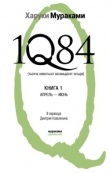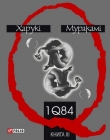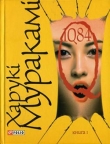
Текст книги "1q84"
Автор книги: Haruki Murakami
Жанр:
Современная проза
сообщить о нарушении
Текущая страница: 10 (всего у книги 81 страниц)
Parallel worlds.
Aomame scowled as if she had bitten into something horribly sour, though the scowl was not as extreme as the earlier one. She started tapping her ballpoint pen against her teeth again, and released a deep groan. The high school student behind her heard it rattle in her throat, but this time pretended not to hear.
This is starting to sound like science fiction.
Am I just making up a self-serving hypothesis as a form of self-defense? Maybe it’s just that I’ve gone crazy. I see my own mind as perfectly normal, as free of distortion. But don’t all mental patients insist that they are perfectly fine and it’s the world around them that is crazy? Aren’t I just proposing the wild hypothesis of parallel worlds as a way to justify my own madness?
This calls for the detached opinion of a third party.
But going to a psychiatrist for analysis is out of the question. The situation is far too complicated for that, and there’s too much that I can’t talk about. Take my recent “work,” for example, which, without a doubt, is against the law. I mean, I’ve been secretly killing men with a homemade ice pick. I couldn’t possibly tell a doctor about that, even if the men themselves have been utterly despicable, twisted individuals.
Even supposing I could successfully conceal my illegal activities, the legal parts of the life I’ve led since birth could hardly be called normal, either. My life is like a trunk stuffed with dirty laundry. It contains more than enough material to drive any one human being to mental aberration—maybe two or three people’s worth. My sex life alone would do. It’s nothing I could talk about to anyone.
No, I can’t go to a doctor. I have to solve this on my own.
Let me pursue this hypothesis a little further if I can.
If something like this has actually happened—if, that is, this world I’m standing in now has in fact taken the place of the old one—then when, where, and how did the switching of the tracks occur, in the most concrete sense?
Aomame made another concentrated effort to work her way back through her memory.
She had first become aware of the changes in the world a few days earlier, when she took care of the oil field development specialist in a hotel room in Shibuya. She had left her taxi on the elevated Metropolitan Expressway No. 3, climbed down an emergency escape stairway to Route 246, changed her stockings, and headed for Sangenjaya Station on the Tokyu Line. On the way to the station, she passed a young policeman and noticed for the first time that something about his appearance was different. That’s when it all started. Which means the world switched tracks just before that. The policeman I saw near home that morning was wearing the same old uniform and carrying an old-fashioned revolver.
Aomame recalled the odd sensation she had felt when she heard the opening of Janáček’s Sinfonietta in the taxi caught in traffic. She had experienced it as a kind of physical wrenching, as if the components of her body were being wrung out like a rag. Then the driver told me about the Metropolitan Expressway’s emergency stairway. I took off my high heels and climbed down. The entire time I climbed down that precarious stairway in my stocking feet with the wind tearing at me, the opening fanfare of Janáček’s Sinfonietta echoed on and off in my ears. That may have been when it started, she thought.
There had been something strange about that taxi driver, too. Aomame still remembered his parting words. She reproduced them as precisely as she could in her mind:
After youdosomething like that, the everydaylookof things might seem to change a little. Things may lookdifferentto you than they did before. But don’t let appearances fool you. There’s always only one reality.
At the time, Aomame had found this odd, but she had had no idea what he was trying to tell her, so she hadn’t given it much thought. She had been in too much of a hurry to puzzle over riddles. Thinking back on it now, though, his remarks had come out of nowhere, and they were truly strange. They could be taken as cautionary advice or an evocative message. What was he trying to convey to me?
And then there was the Janáček music.
How was I able to tell instantly that it was Janáček’s Sinfonietta? And how did I know it was composed in 1926? Janáček’s Sinfonietta is not such popular music that anyone can recognize it on hearing the first few bars. Nor have I ever been such a passionate fan of classical music. I can’t tell Haydn from Beethoven. Yet the moment it came flowing through the car radio, I knew what it was. Why was that, and why should it have given me such an intensely physical—and intensely personal—jolt?
Yes, that jolt was utterly personal. It felt as if something had awakened a memory that had been asleep inside me for years. Something seemed to grab my shoulder and shake me. Which means I might have had a deep connection with that music at some point in my life. The music started playing, threw an automatic switch to “on,” and perhaps some kind of memory came fully awake. Janáček’s Sinfonietta.
But though she tried to probe her memory, Aomame could come up with nothing else. She looked around, stared at her palms, inspected the shape of her fingernails, and grabbed her breasts through her shirt to check the shape. No change. Same size and shape. I’m still the same me. The world is still the same world. But something has started to change. She could feel it. It was like looking for differences between two identical pictures. Two pictures hang on the wall side by side. They look exactly alike, even with careful comparison. But when you examine the tiniest details, minuscule differences become apparent.
Aomame switched mental gears, turned the page of the compact-edition newspaper, and started taking detailed notes on the gun battle at Lake Motosu. There was speculation that the five Chinese-made Kalashnikov AK-47s had been smuggled in through the Korean Peninsula. They were most likely used military surplus in fairly good condition and came with lots of ammunition. The Japan Sea’s coast was a long one. Bringing in weapons and ammunition under cover of night and using a spy ship disguised as a fishing vessel was not that difficult. That was how drugs and weapons were brought into Japan in exchange for massive quantities of Japanese yen.
The Yamanashi Prefectural Police had been unaware that the radicals were so heavily armed. They obtained a search warrant on the (purely pro-forma) charge of inflicting bodily injury, and were carrying only their usual weapons when they piled into two patrol cars and a minibus and headed for the “farm.” This was the headquarters of a group that called itself Akebono, or “First Light.” On the face of it, the group members were simply operating an organic farm. They refused to allow the police to search their property. A confrontation ensued, and at some point it turned into a gun battle.
The Akebono group owned high-powered Chinese-made hand grenades, which fortunately they did not use, purely because they had obtained the grenades so recently that they had not had time to learn how to operate them. If the radicals had used hand grenades, casualties among the police and the Self-Defense Force would almost certainly have been much greater. Initially, the police did not even bring bulletproof vests with them. Critics singled out the police authorities’ poor intelligence analysis and the department’s aging weaponry. What most shocked people, however, was the very fact that there still survived in Japan such an armed radical group operating so actively beneath the surface. The late sixties’ bombastic calls for “revolution” were already a thing of the past, and everyone assumed that the remnants of the radicals had been wiped out in the police siege of the Asama Mountain Lodge in 1972.
When she had finished taking all her notes, Aomame returned the compact newspaper to the reference counter. Choosing a thick book called Composers of the World from the music section, she returned to her table and opened the book to “Janáček.”
. . .
Leoš Janáček was born in a village in Moravia in 1854 and died in 1928. The article included a picture of him in his later years. Far from bald, his head was covered by a healthy thatch of white hair. It was so thick that Aomame couldn’t tell much about the shape of his head. Sinfonietta was composed in 1926. Janáček had endured a loveless marriage, but in 1917, at the age of sixty-three, he met and fell in love with a married woman named Kamila. He had been suffering through a slump, but his encounter with Kamila brought back a vigorous creative urge, and he published one late-career masterpiece after another.
He and Kamila were walking in a park one day when they came across an outdoor concert and stopped to listen. Janáček felt a surge of joy go through his entire body, and the motif for his Sinfonietta came to him. Something seemed to snap in his head, he recounted years later, and he felt enveloped in ecstasy. By chance, he had been asked around that time to compose a fanfare for a major athletic event. The motif that came to him in the park and the motif of the fanfare became one, and Sinfonietta was born. The “small symphony” label is ordinary enough, but the structure is utterly nontraditional, combining the radiant brass of the festive fanfare with the gentle central European string ensemble to produce a unique mood.
Aomame took careful notes on the commentary and the biographical factual material, but the book gave no hint as to what kind of connection there was—or could have been—between herself and this Sinfonietta. She left the library and wandered aimlessly through the streets as evening approached, often talking to herself or shaking her head.
Of course, it’s all just a hypothesis, Aomame told herself as she walked. But it’s the most compelling hypothesis I can produce at the moment. I’ll have to act according to this one, I suppose, until a more compelling hypothesis comes along. Otherwise, I could end up being thrown to the ground somewhere. If only for that reason, I’d better give an appropriate name to this new situation in which I find myself. There’s a need, too, for a special name in order to distinguish between this present world and the former world in which the police carried old-fashioned revolvers. Even cats and dogs need names. A newly changed world must need one, too.
1Q84—that’s what I’ll call this new world, Aomame decided.
Q is for “question mark.” A world that bears a question.
Aomame nodded to herself as she walked along.
Like it or not, I’m here now, in the year 1Q84. The 1984 that I knew no longer exists. It’s 1Q84 now. The air has changed, the scene has changed. I have to adapt to this world-with-a-question-mark as soon as I can. Like an animal released into a new forest. In order to protect myself and survive, I have to learn the rules of this place and adapt myself to them.
. . .
Aomame went to a record store near Jiyugaoka Station to look for Janáček’s Sinfonietta. Janáček was not a very popular composer. The Janáček section was quite small, and only one record contained Sinfonietta, a version with George Szell conducting the Cleveland Orchestra. The A side was Bartók’s Concerto for Orchestra. She knew nothing about these performances, but since there was no other choice, she bought the LP. She went back to her apartment, took a bottle of Chablis from the refrigerator and opened it, placed the record on the turntable, and lowered the needle into the groove. Drinking the well-chilled wine, she listened to the music. It started with the same bright fanfare. This was the music she had heard in the cab, without a doubt. She closed her eyes and gave the music her complete concentration. The performance was not bad. But nothing happened. It was just music playing. She felt no wrenching of her body. Her perceptions underwent no metamorphosis.
After listening to the piece all the way through, she returned the record to its jacket, sat down on the floor, and leaned against the wall, drinking wine. Alone and absorbed in her thoughts, she could hardly taste the wine. She went to the bathroom sink, washed her face with soap and water, trimmed her eyebrows with a small pair of scissors, and cleaned her ears with a cotton swab.
Either I’m funny or the world’s funny, I don’t know which. The bottle and lid don’t fit. It could be the bottle’s fault or the lid’s fault. In either case, there’s no denying that the fit is bad.
Aomame opened her refrigerator and examined its contents. She hadn’t been shopping for some days, so there wasn’t much to see. She took out a ripe papaya, cut it in two, and ate it with a spoon. Next she took out three cucumbers, washed them, and ate them with mayonnaise, taking the time to chew slowly. Then she drank a glass of soy milk. That was her entire dinner. It was a simple meal, but ideal for preventing constipation. Constipation was one of the things she hated most in the world, on par with despicable men who commit domestic violence and narrow-minded religious fundamentalists.
When she was through eating, Aomame got undressed and took a hot shower. Stepping out, she dried herself off and looked at her naked body in the full-length mirror on the back of the door. Flat stomach, firm muscles. Lopsided breasts, pubic hair like a poorly tended soccer field. Observing her nakedness, she suddenly recalled that she would be turning thirty in another week. Another damn birthday. To think I’m going to have my thirtieth birthday in this incomprehensible world, of all places! She knit her brows.
1Q84.
That was where she was now.
CHAPTER 10
Tengo
A REAL REVOLUTION WITH REAL BLOODSHED
“Transfer,” Fuka-Eri said. Then she took Tengo’s hand again. This was just before the train pulled into Tachikawa Station.
They stepped off the train and walked down one set of stairs and up another to a different platform. Fuka-Eri never once let go of Tengo’s hand. They probably looked like a pair of fond lovers to the people around them. There was quite an age difference, but Tengo looked younger than his actual age. Their size difference also probably amused some onlookers. A happy Sunday-morning date in the spring.
Through the hand holding his, however, Tengo felt no hint of affection for the opposite sex. The strength of her grip never changed. Her fingers had something like the meticulous professionalism of a doctor taking a patient’s pulse. It suddenly occurred to Tengo: Perhaps this girl thinks we can communicate wordlessly through the touch of fingers and palms. But even supposing such communication had actually taken place, it was all traveling in one direction rather than back and forth. Fuka-Eri’s palm might well be absorbing what was in Tengo’s mind, but that didn’t mean that Tengo could read Fuka-Eri’s mind. This did not especially worry Tengo, however. There was nothing in his mind—no thoughts or feelings—that he would be concerned to have her know.
Even if she has no feeling for me as a member of the opposite sex, she must like me to some extent, Tengo surmised. Or at least she must not have a bad impression of me. Otherwise, whatever her purpose, she wouldn’t go on holding my hand like this for such a long time.
Having changed now to the platform for the Oume Line, they boarded the waiting train. This station, Tachikawa, was the beginning of the Oume Line, which headed yet farther toward the hills northwest of Tokyo. The car was surprisingly crowded, full of old folks and family groups in Sunday hiking gear. Tengo and Fuka-Eri stood near the door.
“We seem to have joined an outing,” Tengo said, scanning the crowd.
“Is it okay to keep holding your hand,” Fuka-Eri asked Tengo. She had not let go even after they boarded the train.
“That’s fine,” Tengo said. “Of course”
Fuka-Eri seemed relieved and went on holding his hand. Her fingers and palm were as smooth as ever, and free of sweat. They still seemed to be trying to find and verify something inside him.
“You’re not afraid anymore,” she asked without a question mark.
“No, I’m not,” Tengo answered. He was not lying. His Sunday-morning panic attack had certainly lost its force, thanks perhaps to Fuka-Eri’s holding his hand. He was no longer sweating, nor could he hear his heart pounding. The hallucination paid him no visit, and his breathing was as calm as usual.
“Good,” she said without inflection.
Yes, good, Tengo also thought.
There was a simple, rapidly spoken announcement that the train would soon depart, and the train doors rumbled closed, sending an outsized shudder through the train as if some huge, ancient animal were waking itself from a long sleep. As though it had finally made up its mind, the train pulled slowly away from the platform.
Still holding hands with Fuka-Eri, Tengo watched the scenery go past the train window. At first, it was just the usual residential area scenery, but the farther they went, the more the flat Musashino Plain gave way to views of distant mountains. After nearly a dozen stops, the two-track line narrowed down to a single line of rails, and they had to transfer to a four-car train. The surrounding mountains were becoming increasingly prominent. Now they had gone beyond commuting distance from downtown Tokyo. The hills out here retained the withered look of winter, which brought out the brilliance of the evergreens. The smell of the air was different, too, Tengo realized, as the train doors opened at each new station, and sounds were subtly different. Fields lay by the tracks, and farmhouses increased in number. Pickup trucks seemed to outnumber sedans. We’ve really come a long way, Tengo thought. How far do we have to go?
“Don’t worry,” Fuka-Eri said, as if she had read his mind.
Tengo nodded silently. I don’t know, it feels like I’m going to meet her parents to ask for her hand in marriage, he thought.
Finally, after five stops on the single-track section of the line, they got off at a station called Futamatao. Tengo had never heard of the place before. What a strange name. Forked Tail? The small station was an old wooden building. Five other passengers got off with them. No one got on. People came to Futamatao to breathe the clean air on the mountain trails, not to see a performance of Man of La Mancha or go to a disco with a wild reputation or visit an Aston Martin showroom or eat gratin de homard at a famous French restaurant. That much was obvious from the clothing of the passengers who left the train here.
There were virtually no shops by the station, and no people. There was, however, one taxi parked there. It probably showed up whenever a train was scheduled to arrive. Fuka-Eri tapped on the window, and the rear door opened. She ducked inside and motioned for Tengo to follow her. The door closed, Fuka-Eri told the driver briefly where she wanted to go, and he nodded in response.
They were not in the taxi very long, but the route was tremendously complicated. They went up one steep hill and down another along a narrow farm road where there was barely enough room to squeeze past other vehicles. The number of curves and corners was beyond counting, but the driver hardly slowed down for any of them. Tengo clutched the door’s grip in terror. The taxi finally came to a stop after climbing a hill as frighteningly steep as a ski slope on what seemed to be the peak of a small mountain. It felt less like a taxi trip than a spin on an amusement park ride. Tengo produced two thousand-yen bills from his wallet and received his change and receipt in return.
A black Mitsubishi Pajero and a large, green Jaguar were parked in front of the old Japanese house. The Pajero was shiny and new, but the Jaguar was an old model so coated with white dust that its color was almost obscured. It seemed not to have been driven in some time. The air was startlingly fresh, and a stillness filled the surrounding space. It was a stillness so profound one had to adjust one’s hearing to it. The perfectly clear sky seemed to soar upward, and the warmth of the sunlight gently touched any skin directly exposed to it. Tengo heard the high, unfamiliar cry of a bird now and then, but he could not see the bird itself.
The house was large and elegant. It had obviously been built long ago, but it was well cared for. The trees and bushes in the front yard were beautifully trimmed. Several of the trees were so perfectly shaped and matched that they looked like plastic imitations. One large pine cast a broad shadow on the ground. The view from here was unobstructed, but it revealed not a single house as far as the eye could see. Tengo guessed that a person would have to loathe human contact to build a home in such an inconvenient place.
Turning the knob with a clatter, Fuka-Eri walked in through the unlocked front door and signaled for Tengo to follow her. No one came out to greet them. They removed their shoes in the quiet, almost too-large front entry hall. The glossy wooden floor of the corridor felt cool against stocking feet as they walked down it to the large reception room. The windows there revealed a panoramic view of the mountains and of a river meandering far below, the sunlight reflecting on its surface. It was a marvelous view, but Tengo was in no mood to enjoy it. Fuka-Eri sat him down on a large sofa and left the room without a word. The sofa bore the smell of a distant age, but just how distant Tengo could not tell.
The reception room was almost frighteningly free of decoration. There was a low table made from a single thick plank. Nothing lay on it—no ashtray, no tablecloth. No pictures adorned the walls. No clocks, no calendars, no vases. No sideboard, no magazines, no books. The floor had an antique rug so faded that its pattern could not be discerned, and the sofa and easy chairs seemed just as old. There was nothing else, just the large, raft-like sofa on which Tengo was sitting and three matching chairs. There was a large, open-style fireplace, but it showed no signs of having contained a fire recently. For a mid-April morning, the room was downright chilly, as if the cold that had seeped in through the winter had decided to stay for a while. Many long months and years seemed to have passed since the room had made up its mind never to welcome any visitors. Fuka-Eri returned and sat down next to Tengo, still without speaking.
Neither of them said anything for a long time. Fuka-Eri shut herself up in her own enigmatic world, while Tengo tried to calm himself with several quiet deep breaths. Except for the occasional distant bird cry, the room was hushed. Tengo listened to the silence, which seemed to offer several different meanings. It was not simply an absence of sound. The silence seemed to be trying to tell him something about itself. For no reason, he looked at his watch. Raising his face, he glanced at the view outside the window, and then looked at his watch again. Hardly any time had passed. Time always passed slowly on Sunday mornings.
Ten minutes went by like this. Then suddenly, without warning, the door opened and a thinly built man entered the reception room with nervous footsteps. He was probably in his mid-sixties. He was no taller than five foot three, but his excellent posture prevented him from looking unimpressive. His back was as straight as if it had a steel rod in it, and he kept his chin pulled in smartly. His eyebrows were bushy, and he wore black, thick-framed glasses that seemed to have been made to frighten people. His movements suggested an exquisite machine with parts designed for compactness and efficiency. Tengo started to stand and introduce himself, but the man quickly signaled for him to remain seated. Tengo sat back down while the man rushed to lower himself into the facing easy chair, as if in a race with Tengo. For a while, the man simply stared at Tengo, saying nothing. His gaze was not exactly penetrating, but his eyes seemed to take in everything, narrowing and widening like a camera’s diaphragm when the photographer adjusts the aperture.
The man wore a deep green sweater over a white shirt and dark gray woolen trousers. Each piece looked as if it had been worn daily for a good ten years or more. They conformed to his body well enough, but they were also a bit threadbare. This was not a person who paid a great deal of attention to his clothes. Nor, perhaps, did he have people close by who did it for him. The thinness of his hair emphasized the rather elongated shape of his head from front to back. He had sunken cheeks and a square jaw. A plump child’s tiny lips were the one feature of his that did not quite match the others. His razor had missed a few patches on his face—or possibly it was just the way the light struck him. The mountain sunlight pouring through the windows seemed different from the sunlight Tengo was used to seeing.
“I’m sorry I made you come all this way,” the man said. He spoke with an unusually clear intonation, like someone long accustomed to public speaking—and probably about logical topics. “It’s not easy for me to leave this place, so all I could do was ask you to go to the trouble of coming here.”
Tengo said it was no trouble at all. He told the man his name and apologized for not having a business card.
“My name is Ebisuno,” the man said. “I don’t have a business card either.”
“Mr. ‘Ebisuno’?” Tengo asked.
“Everybody calls me ‘Professor.’ I don’t know why, but even my own daughter calls me ‘Professor.’ ”
“What characters do you write your name with?”
“It’s an unusual name. I hardly ever see anybody else with it. Eri, write the characters for him, will you?”
Fuka-Eri nodded, took out a kind of notebook, and slowly, painstakingly, wrote the characters for Tengo on a blank sheet with a ballpoint pen. The “Ebisu” part was the character normally used for ancient Japan’s wild northern tribes. The “no” was just the usual character for “field.” The way Fuka-Eri wrote them, the two characters could have been scratched into a brick with a nail, though they did have a certain style of their own.
“In English, my name could be translated as ‘field of savages’—perfect for a cultural anthropologist, which is what I used to be.” The Professor’s lips formed something akin to a smile, but his eyes lost none of their attentiveness. “I cut my ties with the research life a very long time ago, though. Now, I’m doing something completely different. I’m living in a whole new ‘field of savages.’ ”
To be sure, the Professor’s name was an unusual one, but Tengo found it familiar. He was fairly certain there had been a famous scholar named Ebisuno in the late sixties who had published a number of well-received books. He had no idea what the books were about, but the name, at least, remained in some remote corner of his memory. Somewhere along the way, though, he had stopped encountering it.
“I think I’ve heard your name before,” Tengo said tentatively.
“Perhaps,” the Professor said, looking off into the distance, as if speaking about someone not present. “In any case, it would have been a long time ago.”
Tengo could sense the quiet breathing of Fuka-Eri seated next to him—slow, deep breathing.
“Tengo Kawana,” the Professor said as if reading a name tag.
“That’s right,” Tengo said.
“You majored in mathematics in college, and now you teach math at a cram school in Yoyogi,” the Professor said. “But you also write fiction. That’s what Eri tells me. Is that about right?”
“Yes, it is,” Tengo said.
“You don’t look like a math teacher. You don’t look like a writer, either.”
Tengo gave him a strained smile and said, “Somebody said exactly the same thing to me the other day. It’s probably my build.”
“I didn’t mean it in a bad sense,” the Professor said, pressing back the bridge of his black-framed glasses. “There’s nothing wrong with not looking like something. It just means you don’t fit the stereotype yet.”
“I’m honored to have you say that. I’m not a writer yet. I’m still just trying to write fiction.”
“Trying.”
“It’s still trial and error for me.”
“I see,” the Professor said. Then, as if he had just noticed the chilliness of the room, he rubbed his hands together. “I’ve also heard that you’re going to be revising the novella that Eri wrote in the hopes that she can win a literary magazine’s new writers’ prize. You’re planning to sell her to the public as a writer. Is my interpretation correct?”
“That is basically correct,” Tengo said. “An editor named Komatsu came up with the idea. I don’t know if the plan is going to work or not. Or whether it’s even ethical. My only role is to revise the style of the work, Air Chrysalis. I’m just a technician. Komatsu is responsible for everything else.”
The Professor concentrated on his thoughts for a while. In the hushed room, Tengo could almost hear his brain working. The Professor then said, “This editor, Mr. Komatsu, came up with the idea, and you’re cooperating with him on the technical side.”
“Correct.”
“I’ve always been a scholar, and, to tell you the truth, I’ve never read fiction with much enthusiasm. I don’t know anything about customary practice in the world of writing and publishing fiction, but what you people are planning to do sounds to me like a kind of fraud. Am I wrong about that?”
“No, you are not wrong. It sounds like fraud to me, too,” Tengo said.
The Professor frowned slightly. “You yourself obviously have ethical doubts about this scheme, and still you are planning to go along with it, out of your own free will.”
“Well, it’s not exactly my own free will, but I am planning to go along with it. That is correct.”
“And why is that?”
“That’s what I’ve been asking myself again and again all week,” Tengo said honestly.
The Professor and Fuka-Eri waited in silence for Tengo to continue.
“Reasoning, common sense, instinct—they are all pleading with me to pull out of this as quickly as possible. I’m basically a cautious, commonsensical kind of person. I don’t like gambling or taking chances. If anything, I’m a kind of coward. But this is different. I just can’t bring myself to say no to Komatsu’s plan, as risky as it is. And my only reason is that I’m so strongly drawn to Air Chrysalis. If it had been any other work, I would have refused out of hand.”





